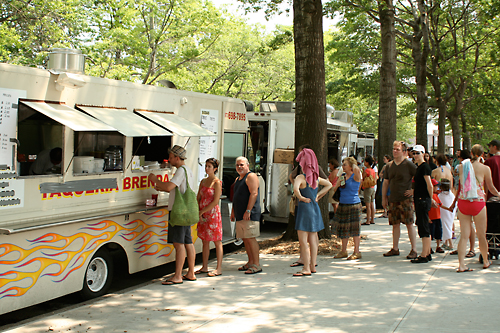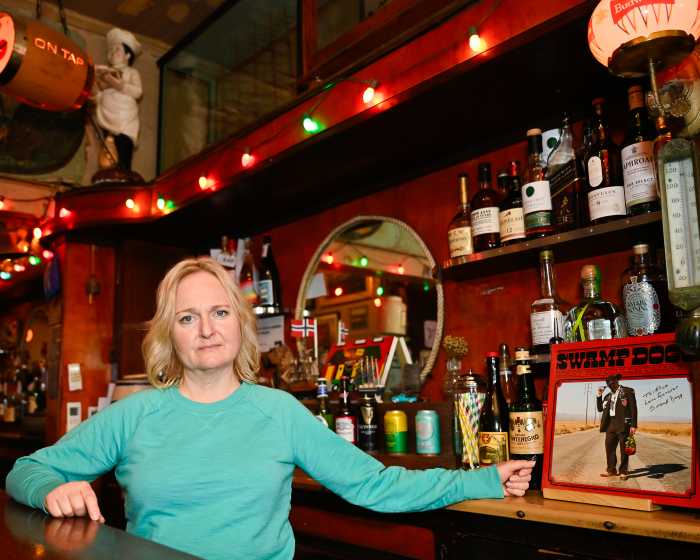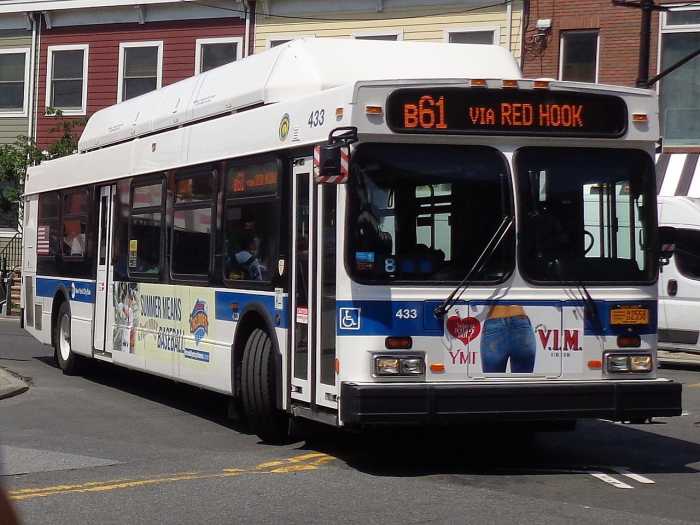Only six of the 13 Latino food vendors in Red Hook Park returned this weekend and were greeted by adoring fans and long lines — a long-awaited comeback that was delayed for months amid tightened city control over the 34-year-old, previously unregulated mercado.
Saturday was the first day this year that the wafting aroma of inexpensive, authentic Latino fare filled the air near the soccer fields at Bay and Clinton streets following a grueling bidding and inspection process that delayed the vendors’ traditional spring kickoff by three months.
The costs of complying with newly enforced Parks and Health department regulations — which the agencies say are the same for all food concessionaires citywide — revamped the weekend market that had become a destination for gourmands as well as the friends and families of the Latino soccer players who have been competing there for decades.
For the first time, vendors were hawking their ceviches, huaraches, pupusas and jugos from expensive food trucks — some of which cost the newly immigrant families $45,000 to purchase in order to comply with the new city rules.
In addition, the vendors were kept out of Red Hook Park, forced to park their expensive trucks on the other side of the park fence. Customers queued up on the sidewalk, making the walking nearly impassable. And because of the dearth of vendors, some foodies waited 90 minutes for what had long been a rite of summer: a simple taco.
“This is not the right way for our kind of business,” said Marcos Lainez, whose family has sold pupusas for about 17 years, gesturing to his hot, cramped cart with a queue about 30 people deep. His $35,000 vehicle broke down on the first day and left him with only one working grill.
Four other vendors are still awaiting an inspection from the Health Department for their new trucks and carts — which they were required to have for the first time — while three concessionaires will not return because they said it was too expensive to purchase and upgrade their stands to comply with the recently enforced regulations.
These changes were as bitter as tamarind juice in the mouths of some vendor fans, who bemoaned what they saw as unnecessary city meddling following the surge in the vendors’ popularity over the last few years.
“They were under the radar for 30 years, and suddenly…the city really cracked down,” said Josh Karant, who writes the Porkchop Express Web site, which championed the vendors in the face of overwhelming city bureaucracy. “And the way [the city] did so was really indiscriminate and thoughtless. … The reality was this group had done a great deal for the community.”
Despite criticism from Karant and many others, a cornucopia of elected and appointed officials gathered on Sunday to welcome the vendors back, and jokingly acknowledged the ordeal they unleashed upon the vendors.
“When bureaucrats get together, they can make almost anything impossible,” joshed Parks Commissioner Adrian Benepe. Pointing to the vendors’ organizer, Cesar Fuentes, Benepe added, “I’m surprised he didn’t give up.”
Benepe faced harsh questioning about the process he set into motion last year that forced the vendors to first bid for the right to continue doing what they’d been doing for decades — then spend tens of thousands of dollars to meet Health codes that were never enforced before.
He defended his actions by saying that food safety was his top priority.

But later, he admitted that there has never been a documented complaint against the vendors or their safety record.
He also was asked whether he had apologized to the vendors for the regulatory ordeal, but he said he had not.
“I told them ‘Welcome back,’” he said.
When the questioning got hotter than a habanero pepper, Sen. Charles Schumer jumped in and mocked at least one of the harsher scribes.
“He did a good thing. We don’t want to bust his chops today,” said Schumer, a vendor fan who earned the nickname “Chimichanga Chuck” from The Brooklyn Paper, a nickname that was embraced by all the dignitaries on Sunday.
Benepe and others said the tough questions were better directed to the Health Department, but no representative of the department was on hand to face the media.
The agency has said that the Red Hook vendors are simply being held to the same standards to protect consumers as any hot dog pushcart in the Big Apple.
“What we’re requiring of the vendors is the same as all the vendors in the city,” department spokeswoman Sarah Markt told The Brooklyn Paper last week.
The governance may amount to an egalitarian approach, but it has already had noticeable impacts on the vendors.
By switching to the mobile carts — much like the ones on city streets in the morning selling pastries and coffee that cost up to $50,000 — there is less space to cook than at the free-standing grills that made Red Hook Park a famous foodie destination.
Tied in with the physical downsizing are cutbacks in employees. Several of the vendors have fewer helpers working for them this year.
And the smaller cooking areas were hard pressed to meet the demand. Customers waited more than one hour in the blistering sun on the pavement for their first huarache or taco of the season, causing some gripes between gulps.
“It’s lost some of its community feel,” said Dominic Rovano, “but the food is just as good.”


























